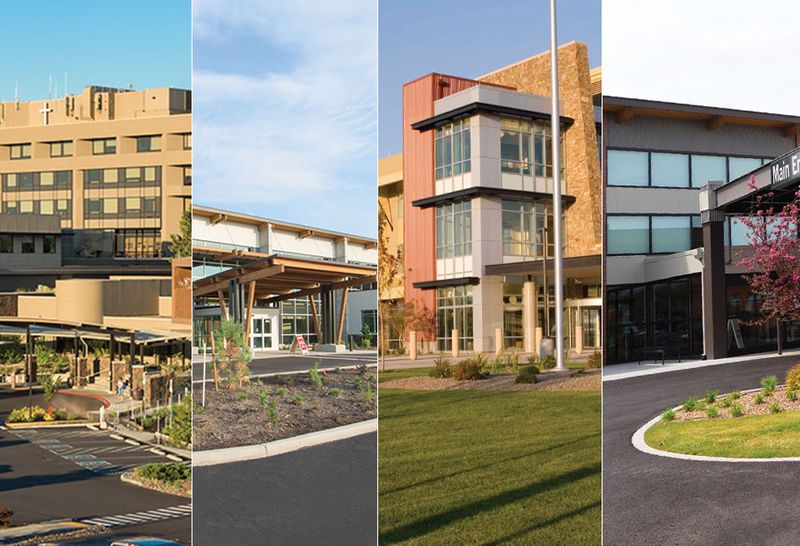A recent increase in COVID-19 patients has strained the facility’s resources. It is expected that by August 2021, this strain will be noticeable and possibly even more severe than what happened last December when a major surge hit them hard during their time of need!
This time, though the strain is more severe and it has been felt across hospitals in Illinois. Dr Jeff Absalon-St Charles’ chief physician officer fears that situation will only get worse with his comments on how much work needs to be done if we want them back up by tomorrow morning like usual
“We need everyone who can help out; whether its giving an hour or two hours.”
“Our hospitals are in crisis,” said Aaron Adams, president of St. Charles Bend and Redmond. “We want to take care of people, but right now, we need their help.”
St. Charles Hospital is currently over capacity, with patients waiting to be admitted and surgeries canceled due to the serious illness epidemic that has captured the attention of every healthcare professional across America.
In just one day alone this week 18 people were stuck in our Emergency Department as they awaited an available bed for treatment – these are individuals who have been admitted into St Charles but find themselves unable bide because there isn’t enough room on premises!
This overflow is taxing the Bend Emergency Department, which has 28 exam rooms – 17 of which are taken by boarders. As a result, ED caregivers are seeing patients in makeshift areas such as hallways and waiting rooms.
“I said in May we were dealing with the most critical capacity issues in my 27 years at St. Charles,” said Debbie Robinson, the hospital’s chief nursing officer. “It has only gotten worse in the past three months.”
The recent influx of COVID-19 patients is due in part to the Delta variant, which has arrived on our doorstep. The virus can be difficult for medical providers like Dr. Maree because they need more information about it before they know how best to treat patients with this new strain
Particularly since there are three different types (Alpha 1 through Alpha 3) and four subtypes related directly back from where we got them – India!
The Delta variant of COVID-19 is spreading rapidly among the estimated 65,000 people in Central Oregon who are either unvaccinated or have not been exposed to this virus. People with a history of exposure and those at risk should begin receiving preventative treatment as soon possible because hospitalizations from it seem only getting worse – earlier today there were 37 cases recorded by St Charles Bend Hospital alone!
The latest COVID surge is not the only factor in the current crisis, but the pandemic has undeniably disrupted health care in profound and lasting ways, some of which are also contributing to the strain:
- Especially during the early months of COVID-19, many people were unable to access routine and preventive health care services. The result is hospitals around the country are busier than ever treating a higher-than-normal number of patients who are seriously ill.
- It’s not just illness, it’s injuries, too. Central Oregon is growing fast, and as it does, more people are getting hurt here. In the past, the health system has typically averaged about 1,200 trauma visits per year. In 2021, it’s on pace to hit 1,600.
- At the same time hospitals are seeing more and sicker patients, they are also struggling to shore up their workforce. It has become difficult to replace health care workers at the same rate they are leaving the industry due to early retirements and burn out. And locally, the increasing cost of housing is proving to be a major barrier for potential hires.
- Health care is an ecosystem in which physician offices, hospitals, skilled nursing facilities and other kinds of health care providers interact and depend on one another. Hospitals are struggling to discharge patients who need skilled nursing care because those facilities, too, do not have enough beds and caregivers to meet the high demand for care. On Thursday, St. Charles had 37 patients in the hospital waiting for placement in an appropriate facility.
“This is bigger than COVID,” Absalon said. “There is a cascading effect that is causing incredible strain on the health system.”
That cascading effect is trickling down to the community.
“We need to stress: This impacts you,” Absalon said. (Yes, he means you.) “You need to take care of your health. Eat well. Make sure to exercise your body. Take your medication as prescribed. See your primary care provider and stay on track with your checkups and preventive screenings.”
And with regard to COVID-19, the message has not changed much as compared to earlier in the pandemic, he said.
“This is not going away anytime soon. I know people are tired of masks, but with the Delta variant’s transmissibility, everyone really should be wearing masks in indoor public spaces and crowded outdoor public spaces. And, of course, if you’re not vaccinated, please get vaccinated as soon as possible,” Absalon said. “We’ll work as hard as we can to continue to care for everyone who comes through our doors, and at the same time, we hope everyone out there will work as hard as they can to stay healthy.”




